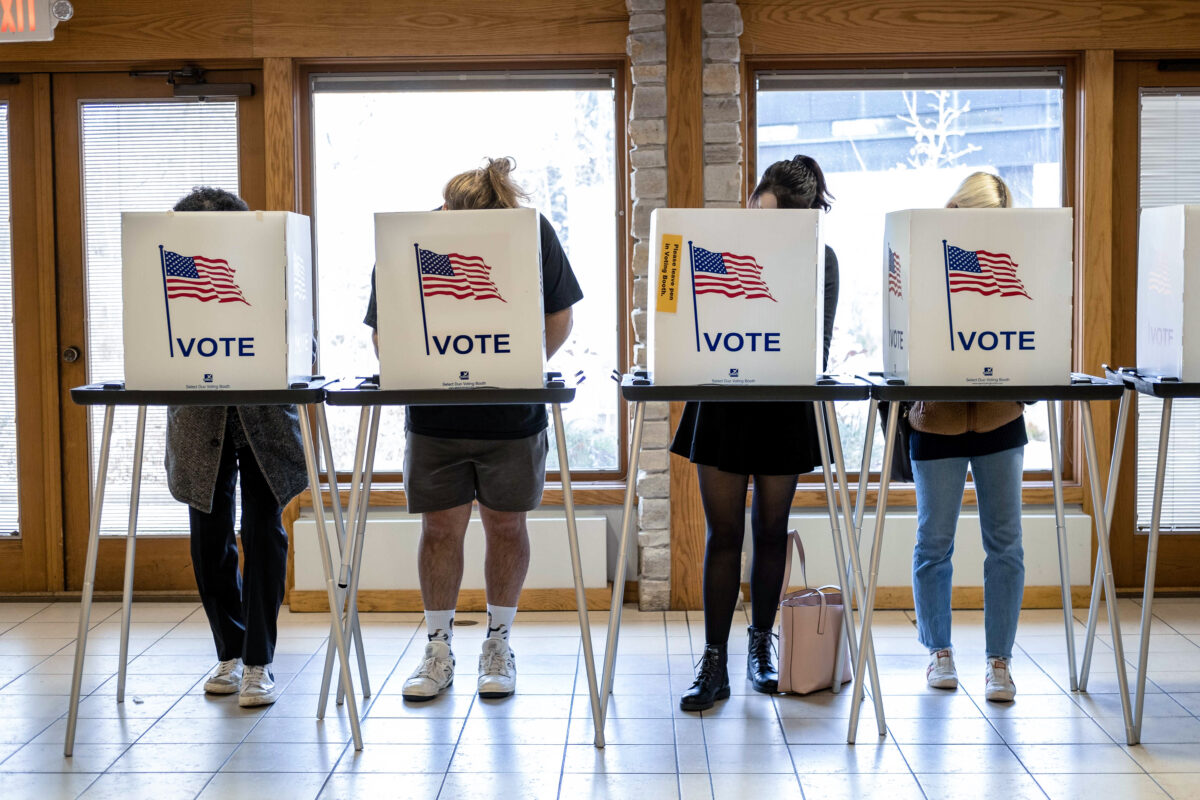


A small, loose-knit group of certified public accountants (CPAs) hope to convince states to apply the same techniques accountants use to assure integrity in business to elections and restore voter confidence.
“What we want to do is make sure that eligible voters can find it very easy to vote, and people who are not eligible to vote can’t. And then we want to make sure that every vote that is cast is counted,” Retired Marine Reserve Colonel Frank Ryan told The Epoch Times.
Ryan, a CPA, is a retired state representative in the Pennsylvania House. He left the seat in December, specifically to work on election security, believing he would have a bigger impact on public policy outside the legislature than from within.
It is not the first time he has been involved in election security. In 2005, when Iraq held its first free election in years to choose an entirely new National Assembly, Ryan facilitated the country’s election. That year, Iraqi voters stuck their fingers in dye so no one could vote twice.
While many think of CPAs as the arithmetic wizard who handles taxes, Art Werner of the Philadelphia firm Werner-Rocca Seminars, who trains CPAs, says they do more than math. The CPA code of ethics and the work they do make CPAs the perfect profession to add oversight to elections.
They set up systems also to show how to avoid fraud and can forensically determine if there’s been fraud or mismanagement.
“The main function of a CPA is to do two things: one, to tell people what happened in the past. To do so, they design systems that can be reviewed in a manner that can guarantee that they are impartial and can guarantee that the results are proper, which allows, for example, banks to have confidence in financial statements that a CPA prepares,” Werner told The Epoch Times.
For example, when banks loan money, they rely on the CPA’s reports, balance sheets, and income statements prepared by the CPAs to determine the health of a company.
“The CPA can design internal systems, well beyond this financial structure, that do the same thing. Can they design a system of internal controls so that people could redeem trust in elections? The answer is, a CPA can easily do that.”
Adding CPA systems to elections in every state would increase much-needed trust, he said.
“Even if every state right now has a system that is working, if the people of the United States have a suspicion that there’s a problem, it lends to the fact that people will then walk away and say that we have an unfair election,” Werner said. “Maybe the CPA, by their involvement, can establish a system that will say, we have set up something that guarantees that it’s fair. Even if it turns out the results are the same, people will trust it.”
The Pennsylvania Auditor General’s damning 2019 performance audit of the Statewide Uniform Registry Electors (SURE) system, which is administered by the Department of State, caught Ryan’s attention when it came out.
“We identified tens of thousands of potential duplicate and inaccurate voter records, as well as voter records for nearly three thousand potentially deceased voters that had not been removed from SURE,” the audit said. “We found that voter record information was inaccurate due to weaknesses in the voter registration application process and the maintenance of voter records in SURE. Specifically, voter registration applications remain in pending status for long periods of time—indefinitely in some cases, and although list maintenance activities are performed by counties, insufficient analysis and monitoring has resulted in inaccurate data in the voter records.”
Ryan said he was shocked by the report, written by a Democrat Auditor General, Eugene DePasquale, to a Democrat-led administration.
“We are very discouraged by management’s response to our draft findings,” the report went on. “We were quite surprised that the Department of State’s (DOS) response indicates that it strongly disagrees with many of our findings and mischaracterizes information that was provided, or not provided to us in many instances, during the course of our audit. With its attempt to refute our findings, DOS does not seem to understand that a primary objective of our audit was to assess the accuracy of records maintained in the SURE system. Our audit procedures disclosed internal control weaknesses related to input and maintenance of voter records, and our data analysis revealed examples of potential inaccuracies, all of which should be properly investigated by forwarding the information to the counties for further review. We are concerned that DOS, and therefore the counties, will not utilize the information provided to them in the audit because it is assuming that the data in the SURE system is accurate. Our data analysis strongly suggests otherwise.”
The DOS requested the audit, DePasquale wrote, by did not seem to grasp the auditor cannot properly satisfy the objectives of the audit in accordance with generally accepted government auditing standards without obtaining evidence, which the DOS refused to provide to the auditor. Robert Torres was the acting secretary of DOS at the time.
Still a state representative at the time, Ryan recalled this report after the 2020 election, when a voter deficit report was released.
“They said there were approximately 200,000 voters we couldn’t identify,” Ryan said. “I called up a number of CPA firms after the 2020 election to say, ‘Look, I believe that there are irregularities and inconsistencies. Would you be willing to do a forensic audit?’ Every CPA firm I approach said absolutely not, it’s too politically charged, and we would lose customers over this. I truly understand that.”
His CPA friends asked him why he was getting involved, and he sent them the 2019 auditor’s report.
“They all called me back, all of them, and said, this is negligent on the part of a CPA—it’s called subordination of judgment—for us not to track these issues down,” Ryan said. “I can’t tell who won the [2020] election. The systems are that problematic.”
Now Ryan had a group of CPAs who were concerned about election integrity. They tried to look into it and soon saw that questioning elections after the results are in is politically charged.
“My objection was not the 2020 election. It was about the system of internal controls about the election,” Ryan said. “We found that very quickly became overtaken by the perception that we were trying to dispute the election results, which I did, but that wasn’t the basis of the dispute. The basis of the dispute was the auditor general’s report, which basically said that there were major flaws in the system of elections…who is better qualified to design systems of controls than the CPA who’s responsible for designing controls in corporations?”
That is why Ryan and a few other CPAs are writing draft legislation that would encourage states to add a layer of CPA-style system controls to whatever voting system they already have in place in their state.
Under their plan, the Department of State would own the voting process, the auditor general would be responsible for auditing the process, and a “bureau of election audits,” a new agency, would investigate any questions that come up after the election.
In Luzerne County, Pennsylvania, they ran out of ballots in a recent election. A bureau of election audits would investigate how that happened, figure out how to prevent it from happening again, and assess the likelihood that it had an impact on the election results.
Ultimately, the plan is to design a system of controls upfront, before the election, to make sure there is sound, established key performance metrics, which is what a system of internal controls mandates, Ryan said.
When it’s ready, Ryan plans to present the plan to Pennsylvania legislators, and there are CPAs in New Jersey and Maryland ready to promote it. In time, he intends to find an advocacy group to pick up the plan and get it passed in states across the nation.
The American Institute of Certified Public Accountants includes the following responsibilities in its code of conduct:
Responsibilities principle: In carrying out their responsibilities as professionals, members should exercise sensitive professional and moral judgments in all their activities.
The public interest principle: Members should accept the obligation to act in a way that will serve the public interest, honor the public trust, and demonstrate a commitment to professionalism.
A distinguishing mark of a profession is acceptance of its responsibility to the public. The accounting profession’s public consists of clients, credit grantors, governments, employers, investors, the business and financial community, and others who rely on the objectivity and integrity of members to maintain the orderly functioning of commerce. This reliance imposes a public interest responsibility on members. The public interest is defined as the collective well-being of the community of people and institutions that the profession serves.
In discharging their professional responsibilities, members may encounter conflicting pressures from each of those groups. In resolving those conflicts, members should act with integrity, guided by the precept that when members fulfill their responsibility to the public, clients’ and employers’ interests are best served.

